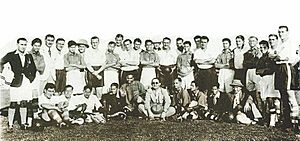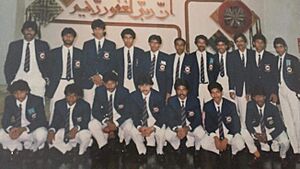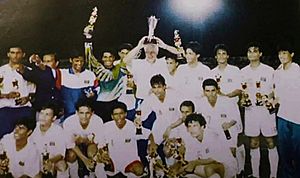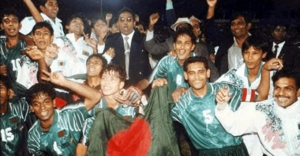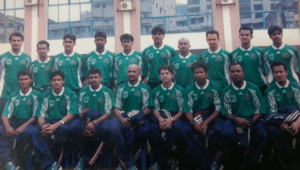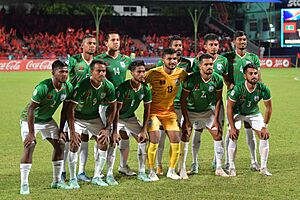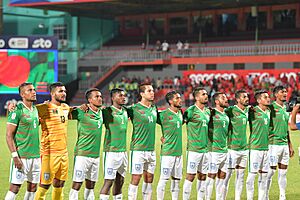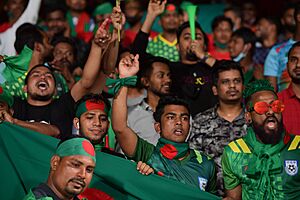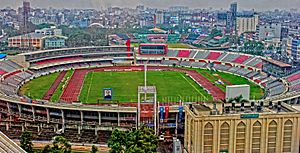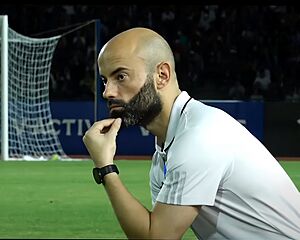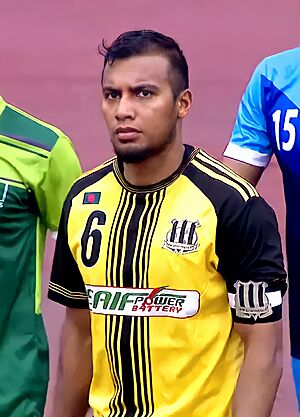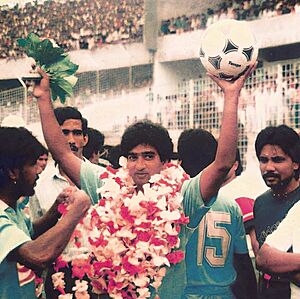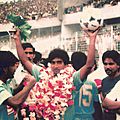Bangladesh national football team facts for kids
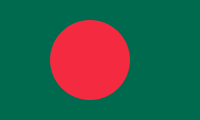 |
|||||||||||||||||||||||||||||||||||||||||
| Nickname(s) |
|
||||||||||||||||||||||||||||||||||||||||
|---|---|---|---|---|---|---|---|---|---|---|---|---|---|---|---|---|---|---|---|---|---|---|---|---|---|---|---|---|---|---|---|---|---|---|---|---|---|---|---|---|---|
| Association | Bangladesh Football Federation (BFF) | ||||||||||||||||||||||||||||||||||||||||
| Confederation | AFC (Asia) | ||||||||||||||||||||||||||||||||||||||||
| Sub-confederation | SAFF (South Asia) | ||||||||||||||||||||||||||||||||||||||||
| Head coach | Javier Cabrera | ||||||||||||||||||||||||||||||||||||||||
| Captain | Jamal Bhuyan | ||||||||||||||||||||||||||||||||||||||||
| Most caps | Jamal Bhuyan (88) | ||||||||||||||||||||||||||||||||||||||||
| Top scorer | Ashraf Uddin Ahmed Chunnu (17) | ||||||||||||||||||||||||||||||||||||||||
| Home stadium | National Stadium | ||||||||||||||||||||||||||||||||||||||||
| FIFA code | BAN | ||||||||||||||||||||||||||||||||||||||||
|
|||||||||||||||||||||||||||||||||||||||||
| FIFA ranking | |||||||||||||||||||||||||||||||||||||||||
| Current | 192 |
||||||||||||||||||||||||||||||||||||||||
| Highest | 110 (April 1996) | ||||||||||||||||||||||||||||||||||||||||
| Lowest | 197 (February–May 2018) | ||||||||||||||||||||||||||||||||||||||||
| First international | |||||||||||||||||||||||||||||||||||||||||
(Kuala Lumpur, Malaysia; 27 July 1973) |
|||||||||||||||||||||||||||||||||||||||||
| Biggest win | |||||||||||||||||||||||||||||||||||||||||
(Dhaka, Bangladesh; 23 December 1985) |
|||||||||||||||||||||||||||||||||||||||||
| Biggest defeat | |||||||||||||||||||||||||||||||||||||||||
(Incheon, South Korea; 16 September 1979) (Karachi, Pakistan; 18 February 1982) |
|||||||||||||||||||||||||||||||||||||||||
| Asian Cup | |||||||||||||||||||||||||||||||||||||||||
| Appearances | 1 (first in 1980) | ||||||||||||||||||||||||||||||||||||||||
| Best result | Group stage (1980) | ||||||||||||||||||||||||||||||||||||||||
| AFC Challenge Cup | |||||||||||||||||||||||||||||||||||||||||
| Appearances | 2 (first in 2006) | ||||||||||||||||||||||||||||||||||||||||
| Best result | Quarter-finals (2006) | ||||||||||||||||||||||||||||||||||||||||
| SAFF Championship | |||||||||||||||||||||||||||||||||||||||||
| Appearances | 13 (first in 1995) | ||||||||||||||||||||||||||||||||||||||||
| Best result | Champions (2003) | ||||||||||||||||||||||||||||||||||||||||
|
Medal record
|
|||||||||||||||||||||||||||||||||||||||||
The Bangladesh national football team represents Bangladesh in international football. It is managed by the Bangladesh Football Federation (BFF). The team joined the AFC in 1973 and FIFA in 1976.
Bangladesh played its first official game in 1973. The team has not yet qualified for the FIFA World Cup. They played in the AFC Asian Cup once, in 1980. Bangladesh is one of only two South Asian countries to achieve this. The team's best wins have been in South Asia. They won the SAFF Gold Cup in 2003. They also won gold medals at the South Asian Games in 1999.
In the 1980s and early 1990s, Bangladesh was a rising team in Asia. However, since 2000, football in Bangladesh has been less popular. This is partly because the national cricket team became more successful. Football is still a popular sport in Bangladesh.
Contents
History of Bangladesh Football
Early Days (1895–1972)
In 1895, the Dacca Sporting Association (DSA) was formed in Dhaka. By the 1930s, football was growing in East Bengal. On November 21, 1937, the Islington Corinthians from England played against DSA XI in Dhaka. The Dhaka team won 1–0, which was the English team's first loss on their tour. Most DSA XI players were students from Dhaka University. People were very happy to see the local team win.
During the 1971 Liberation War, the Shadhin Bangla football team was formed. They played games across India to raise money for the new Bangladesh government. After Bangladesh became independent from Pakistan in 1971, a team called Dhaka XI was active. This team won a friendly match against Mohun Bagan and finished second in India's Bordoloi Trophy.
Starting Strong (1973–1984)
The Bangladesh Football Federation (BFF) was created on July 15, 1972. It joined the AFC in 1973 and FIFA in 1976. Sheikh Shaheb Ali became the first national team coach. Zakaria Pintoo, who led the Shadhin Bangla Team, became the captain.
On July 27, 1973, Bangladesh played its first official game. It was a 2–2 draw against Thailand in the Merdeka Cup. Enayetur Rahman scored Bangladesh's first international goal. On August 13, 1973, Bangladesh got its first win. They beat Singapore 1–0 in a friendly match.
In 1979, Bangladesh played in the AFC Asian Cup qualifiers for the first time. They drew with Afghanistan and Qatar. They then beat Afghanistan 3–2, which helped them qualify for the main tournament.
The 1980 AFC Asian Cup was held in Kuwait. Bangladesh lost all their games but scored two goals. Kazi Salahuddin and Ashrafuddin Ahmed Chunnu scored these goals. In 1982, Badal Roy scored a goal against Malaysia at the Asian Games. This was Bangladesh's first win in Asia's biggest tournament at that time.
Ups and Downs (1985–2002)
In 1985, Bangladesh played in the 1986 World Cup qualifiers. They got their first win in the qualifiers against Indonesia. Kaiser Hamid and Ashrafuddin Ahmed Chunnu scored the goals. They also beat Thailand 1–0.
In 1995, Otto Pfister became the coach. On November 4, 1995, Bangladesh won the 4-nation Tiger Trophy in Myanmar. This was the country's first major trophy. In 1996, FIFA ranked Bangladesh 110th, their highest ranking ever.
In 1999, the Bangladesh team, coached by Samir Shaker, won a gold medal at the South Asian Games. They beat hosts Nepal in the final.
On January 12, 2001, Bangladesh played its first match against a European team, Bosnia & Herzegovina. They lost 2–0. On March 18, 2001, Firoj Mahmud Titu became the first Bangladeshi player to score against a European team. This was against FR Yugoslavia.
SAFF Gold Cup Victory (2003)
In 2003, Bangladesh hosted the SAFF Championship in Dhaka. Coach György Kottán led the team. Bangladesh won their first game against Nepal 1–0, with Alfaz Ahmed scoring. They also beat Maldives 1–0 and Bhutan 3–0.
In the semifinals, they faced India, who were the defending champions. Bangladesh won 2–1 with a "golden goal" from Motiur Munna. In the final, Bangladesh played Maldives again. Rokonuzzaman Kanchan scored early for Bangladesh. Maldives equalized, and the game went to a penalty shootout. Goalkeeper Aminul Haque saved a penalty. Mohammed Sujan scored the winning penalty. Bangladesh won their first SAFF Championship in front of 46,000 fans.
Recent Years (2003–Present)
After their SAFF Gold Cup win, Bangladesh struggled in other tournaments. They reached the final of the 2005 SAFF Championship but lost to India. In 2009, Brazil's Dido became coach. Under him, Bangladesh won two games in the 2010 AFC Challenge Cup qualifiers.
On June 29, 2011, Bangladesh beat Pakistan 3–0 in the 2014 FIFA World Cup qualifiers. This win allowed them to advance to the next round against Lebanon. They lost the first game 4–0 but won the second 2–0. However, they were eliminated.
In 2016, Bangladesh lost 3–1 to Bhutan in the AFC Asian Cup 2019 qualification playoff. This meant Bangladesh would not play in any AFC or FIFA tournaments for two years. By February 2018, Bangladesh's FIFA ranking dropped to 197, their lowest ever.
In May 2018, Jamie Day became coach. Bangladesh reached the 2022 World Cup qualifiers – AFC second round. They drew with India and Afghanistan. In September 2021, Javier Cabrera became the head coach. The team continues to work hard to improve their performance.
Team Look
Media Coverage
Bangladesh's home and away games are shown live on Bangladesh Television, Bangla TV & T Sports in Bangladesh.
Team Kits
The Bangladesh national football team wears bottle green shirts and dark red shorts. These colors come from the national flag of Bangladesh. Green stands for the rich land, and red represents the rising sun and the blood of those who fought for independence. The away jersey is usually the opposite color. The team's kit often features the logo of the Bangladesh Football Federation.
In 2011, Grameenphone became the team's sponsor for three years. After a few years without a sponsor, TVS Motor Company from India sponsored the team from 2019 to 2021. In 2021, the federation held a contest to design a new jersey for the 2021 SAFF Championship. In 2025, Dour, a local sportswear company, signed a two-year deal to be the kit sponsor. Also in 2025, United Commercial Bank signed a five-year deal to sponsor the men's senior national team.
| Year | Kit Manufacturer/ Sponsor | Ref |
|---|---|---|
| 1973–1998 | Unknown | |
| 1998–2000 | ||
| 2000–2001 | ||
| 2001–2005 | None | |
| 2005–2007 | ||
| 2008–2010 | ||
| 2010–2011 | ||
| 2011–2013 | ||
| 2014–2015 | ||
| 2015–2016 | ||
| 2016–2019 | None | |
| 2019–2021 | ||
| 2021–2025 | None | |
| 2025–present | ||
Supporters
In the 1970s and 1980s, football was very popular in Bangladesh. The Dhaka First Division League attracted many fans. However, since the 2000s, football's popularity has decreased. This is because other sports have become more successful. The National Stadium in Dhaka often has low attendance for games.
Outside Dhaka, football is still very popular. Games in Sylhet and Jessore draw large crowds. In August 2014, 50,000 fans attended a friendly match in Sylhet. This was between Bangladesh U23 and Nepal U23. The stadium was so full that fans broke the main entrance to get in.
The first official supporters group for the national team, the Bangladeshi Football Ultras, was formed in 2019.
Bangladesh Red and Green Teams
From 1981 to 1993, the President's Gold Cup was held almost every year. The Bangladesh Football Federation entered two teams: Bangladesh Red and Bangladesh Green. This was because many good players could not get into the main national team.
The "second string" or youth players often played for these teams. In the 1989 President's Gold Cup, Bangladesh Red won the tournament. They beat the South Korea University team in the final. This is not considered Bangladesh's first international trophy. This is because the tournament mostly included club teams.
Home Stadiums
Bangladesh plays most of its home matches at the National Stadium in Dhaka. This is where they won the 2003 SAFF Championship. The stadium was first built in 1954. The Bangladesh Football Federation took full control of the stadium in 2004.
Before 2011, the National Stadium could hold about 55,000 people. After renovations, its capacity is now 36,000. It is still the largest stadium in Bangladesh. Since the Bangladesh Premier League started in 2007, the stadium has hosted most league games. It has hosted the SAFF Championship three times: in 2003, 2009, and 2018.
The National Stadium was renovated again in 2021. It is expected to reopen in 2025. The renovations include new seats and large LED screens. This is part of the Bangladesh Football Federation's plan to create a modern football stadium. Sometimes, home matches are also played at other stadiums. These include Sheikh Kamal Stadium in Nilphamari, Sylhet District Stadium in Sylhet, and Bashundhara Kings Arena in Dhaka.
Recent Matches
Here are the results of matches from the last year and upcoming games.
Win Draw Loss Fixture
2024 Matches
| 5 September 2024 Friendly | Bhutan |
0–1 | Thimphu, Bhutan | |
| 18:00 UTC+6 | Morsalin |
Stadium: Changlimithang Stadium Referee: Prajwol Chhetri (Nepal) |
| 8 September 2024 Friendly | Bhutan |
1–0 | Thimphu, Bhutan | |
| 18:00 UTC+6 | Wangchuk |
Stadium: Changlimithang Stadium Referee: Prajwol Chhetri (Nepal) |
| 5 November 2024 Hybrid friendly1 | Bangladesh |
1–0 | Dhaka, Bangladesh | |
| 18:00 UTC+6 | Nova |
Stadium: Bashundhara Kings Arena |
| 8 November 2024 Hybrid friendly1 | Bangladesh |
3–2 | Dhaka, Bangladesh | |
| 18:00 UTC+6 | Stadium: Bashundhara Kings Arena |
| 13 November 2024 Friendly | Bangladesh |
0–1 | Dhaka, Bangladesh | |
| 18:00 BST (UTC+6) | Fasir |
Stadium: Bashundhara Kings Arena Referee: Virendha Rai (Bhutan) |
| 16 November 2024 Friendly | Bangladesh |
2–1 | Dhaka, Bangladesh | |
| 18:00 BST (UTC+6) | Fasir |
Stadium: Bashundhara Kings Arena Referee: Virendha Rai (Bhutan) |
2025 Matches
| 25 March 2025 2027 ACQ – 3R | India |
0–0 | Shillong, India | |
| 19:00 UTC+5:30 | Stadium: JLN Stadium Attendance: 14,952 Referee: Hussein Abo Yehia (Lebanon) |
| 4 June 2025 Friendly | Bangladesh |
2–0 | Dhaka, Bangladesh | |
| 19:00 BST (UTC+6) | Stadium: National Stadium Attendance: 17,645 Referee: Kasun Lakmal Weerakkody (Sri Lanka) |
| 10 June 2025 2027 ACQ – 3R | Bangladesh |
1–2 | Dhaka, Bangladesh | |
| 19:00 BST (UTC+6) |
|
Stadium: National Stadium Attendance: 21,317 Referee: Clifford Daypuyat (Philippines) |
| 14 October 2025 2027 ACQ – 3R | Hong Kong |
v | Kowloon, Hong Kong | |
| Stadium: Kai Tak Sports Park Main Stadium |
2026 Matches
| 31 March 2026 2027 ACQ – 3R | Singapore |
v | Kallang, Singapore | |
| Stadium: National Stadium |
- 1 Non FIFA 'A' international match
Coaching Staff
The coaching staff helps the team train and prepare for matches.
Players
Current Team Squad
The following 23 players were chosen for the match against Singapore on June 10, 2025.
Caps (games played) and goals are correct as of June 10, 2025, after the game against Singapore.
| No. | Pos. | Player | Date of birth (age) | Caps | Goals | Club |
|---|---|---|---|---|---|---|
| 1 | GK | Mehedi Hasan Srabon | 12 August 2005 | 2 | 0 | |
| 12 | GK | Sujon Hossain | 5 August 1996 | 0 | 0 | |
| 13 | GK | Mitul Marma | 11 December 2003 | 15 | 0 | |
|
|
||||||
| 3 | DF | Rahmat Mia | 8 December 1999 | 36 | 0 | |
| 4 | DF | Topu Barman (Vice-captain) | 20 December 1994 | 64 | 6 | |
| 2 | DF | Shakil Ahad Topu | 6 April 2006 | 5 | 0 | |
| 14 | DF | Tariq Kazi | 6 October 2000 | 30 | 2 | |
| 22 | DF | Md Saad Uddin | 1 September 1998 | 41 | 2 | |
| 24 | DF | Jahid Hasan Shanto | 1 June 2002 | 0 | 0 | |
| 25 | DF | Md Taj Uddin | 18 July 2002 | 1 | 0 | |
|
|
||||||
| 5 | MF | Mohammad Ridoy | 1 January 2002 | 25 | 0 | |
| 6 | MF | Jamal Bhuyan (Captain) | 10 April 1990 | 88 | 1 | |
| 7 | MF | Shekh Morsalin | 19 February 2005 | 18 | 5 | |
| 8 | MF | Hamza Choudhury | 1 October 1997 | 3 | 1 | |
| 17 | MF | Sohel Rana | 27 March 1995 | 73 | 1 | |
| 21 | MF | Syed Quazem Shah | 25 October 1998 | 4 | 0 | |
| 23 | MF | Shamit Shome | 5 September 1997 | 1 | 0 | |
|
|
||||||
| 9 | FW | Shahriar Emon | 7 March 2001 | 7 | 0 | |
| 10 | FW | Rakib Hossain | 18 November 1998 | 45 | 5 | |
| 11 | FW | Foysal Ahmed Fahim | 24 February 2002 | 26 | 1 | |
| 16 | FW | Fahamedul Islam | 30 June 2006 | 2 | 0 | |
| 15 | FW | Al-Amin | 29 March 2004 | 2 | 0 | |
| 26 | FW | Sumon Reza | 15 June 1995 | 27 | 1 | |
Recent Players Called Up
These players have also been called up to the Bangladesh squad in the last year.
| Pos. | Player | Date of birth (age) | Caps | Goals | Club | Latest call-up |
|---|---|---|---|---|---|---|
| GK | Anisur Rahman Zico | 10 August 1997 | 31 | 0 | v. |
|
| GK | Shakib Al Hasan | 11 November 2004 | 0 | 0 | v. |
|
| GK | Pappu Hossain | 7 April 1999 | 0 | 0 | v. |
|
|
|
||||||
| DF | Isa Faysal | 20 August 1999 | 15 | 0 | v. |
|
| DF | Shakil Hossain | 6 July 2002 | 10 | 0 | v. |
|
| DF | Sushanto Tripura | 5 October 1998 | 7 | 0 | v. |
|
| DF | Yeasin Khan | 16 September 1994 | 32 | 0 | v. |
|
| DF | Mehedi Hasan Mithu | 24 October 1994 | 5 | 0 | v. |
|
| DF | Hasan Murad Tipu | 2 January 1998 | 2 | 0 | v. |
|
| DF | Bishwanath Ghosh | 30 May 1999 | 43 | 0 | v. |
|
|
|
||||||
| MF | Mojibur Rahman Jony | 1 January 2005 | 21 | 2 | v. |
|
| MF | Mohamed Sohel Rana | 1 June 1996 | 19 | 0 | v. |
|
| MF | Chandon Roy | 4 May 2007 | 5 | 0 | v. |
|
| MF | Papon Singh | 31 December 1999 | 3 | 1 | v. |
|
| MF | Jayed Ahmed | 14 December 2002 | 2 | 0 | v. |
|
| MF | Didarul Alam | 5 January 1996 | 0 | 0 | v. |
|
|
|
||||||
| FW | Mohammad Ibrahim | 7 August 1997 | 41 | 4 | v. |
|
| FW | Arif Hossain | 31 December 2001 | 0 | 0 | v. |
|
| FW | Piash Ahmed Nova | 25 September 2005 | 1 | 0 | v. |
|
| FW | Md Rabby Hossen Rahul | December 30, 2006 | 2 | 0 | v. |
|
| FW | Md Rafiqul Islam | February 12, 2004 | 7 | 0 | v. |
|
| FW | Arman Foysal Akash | 13 January 2004 | 0 | 0 | v. |
|
| FW | Mirajul Islam | 1 October 2006 | 1 | 0 | v. |
|
|
INJ Withdrew due to injury |
||||||
Player Records
These are the players with the most appearances and goals for Bangladesh.
- Players in bold are still playing for Bangladesh.
Most Games Played
| Rank | Player | Caps | Goals | Career |
|---|---|---|---|---|
| 1 | Jamal Bhuyan | 88 | 1 | 2013–present |
| 2 | Sohel Rana | 73 | 1 | 2013–present |
| 3 | Rajani Kanta Barman | 69 | 0 | 1997–2009 |
| 4 | Mamunul Islam | 67 | 3 | 2008–2020 |
| 5 | Zahid Hasan Ameli | 64 | 15 | 2005–2016 |
| 6 | Topu Barman | 64 | 6 | 2014–present |
| 7 | Alfaz Ahmed | 62 | 12 | 1995–2008 |
| 8 | Kaiser Hamid | 59 | 5 | 1984–1993 |
| 9 | Mohd Aminul Haque | 56 | 0 | 1998–2010 |
| 10 | Hassan Al-Mamun | 54 | 0 | 1995–2008 |
Top Goal Scorers
| Rank | Player | Goals | Caps | Ratio | Career |
|---|---|---|---|---|---|
| 1 | Ashraf Uddin Ahmed Chunnu | 17 | 50 | 0.34 | 1975–1985 |
| 2 | Zahid Hasan Ameli | 15 | 64 | 0.23 | 2005–2016 |
| 3 | Sheikh Mohammad Aslam | 14 | 51 | 0.27 | 1978–1993 |
| 4 | Alfaz Ahmed | 12 | 62 | 0.19 | 1995–2008 |
| 5 | Kazi Salahuddin | 9 | 29 | 0.32 | 1973–1983 |
| 6 | Khandoker Wasim Iqbal | 8 | 47 | 0.17 | 1982–1989 |
| Shakhawat Hossain Rony | 8 | 20 | 0.4 | 2011–2018 | |
| 8 | Mamun Joarder | 7 | 33 | 0.21 | 1990–1997 |
| Enamul Haque | 7 | 16 | 0.44 | 2009–2016 | |
| 10 | Imtiaz Ahmed Nakib | 6 | 21 | 0.29 | 1990–1999 |
| Rizvi Karim Rumi | 6 | 23 | 0.26 | 1988–1994 | |
| Rokonuzzaman Kanchan | 6 | 29 | 0.21 | 2000–2006 | |
| Mohamed Zahid Hossain | 6 | 36 | 0.17 | 2007–2016 | |
| Topu Barman | 6 | 64 | 0.09 | 2014–present |
Team Achievements
Regional Titles
- SAFF Championship
 Champions (1): 2003
Champions (1): 2003 Runners-up (2): 1999, 2005
Runners-up (2): 1999, 2005 Third place (2): 1995, 2009, 2023
Third place (2): 1995, 2009, 2023
- South Asian Games
 Gold medal (1): 1999
Gold medal (1): 1999 Silver medal (4): 1984, 1985, 1989, 1995
Silver medal (4): 1984, 1985, 1989, 1995 Bronze medal (1): 1991
Bronze medal (1): 1991
Friendly Tournament Wins
- Bangabandhu Gold Cup
 Runners-up (1): 2015
Runners-up (1): 2015
- Quaid-e-Azam International Tournament
 Runners-up (1): 1985
Runners-up (1): 1985 Third place (1): 1987
Third place (1): 1987
- President's Gold Cup
 Champions (1): 1989
Champions (1): 1989
- 4-nation Tiger Trophy
 Champions (1): 1995
Champions (1): 1995
- Jigme Dorji Wangchuk Memorial Trophy
 Champions (1): 2003
Champions (1): 2003
- Mujib Borsho FIFA International Football Series
 Champions (1): 2020
Champions (1): 2020
- Three Nations Cup
 Runners-up (1): 2021
Runners-up (1): 2021
Images for kids
See also
 In Spanish: Selección de fútbol de Bangladés para niños
In Spanish: Selección de fútbol de Bangladés para niños
 | Delilah Pierce |
 | Gordon Parks |
 | Augusta Savage |
 | Charles Ethan Porter |


